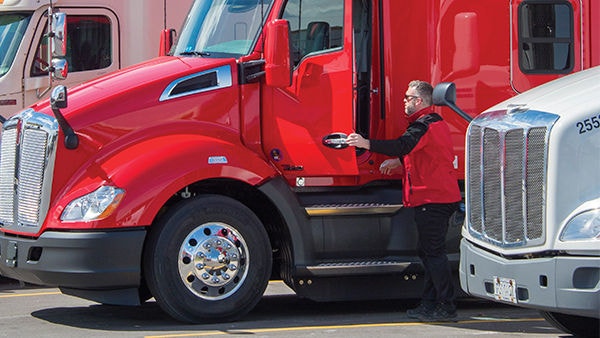The Regulatory Radar for 2023
Mark Schedler, Sr. Editor - Transport
January 5, 2023

Passenger carrier guidance published November 15, 2022
Federal Motor Carrier Safety Administration (FMCSA) published Appendix A to Part 390 regarding the applicability of passenger-carrier safety regulations, interstate for-hire authority, and financial responsibility (insurance). Several interstate passenger-carrying commercial motor vehicles (CMV) scenarios are covered, including:
- Passengers using a combination of air and ground transport;
- Education-related transportation, private and government-run;
- Faith-based organizations;
- Employer-related;
- Assisted living facilities; and
- Youth camps.
Two final-rule changes
Canada ELD mandate - January 1, 2023
Federally regulated Canadian and United States-based carriers operating in Canada and intra-provincial carriers in Newfoundland, New Brunswick, Ontario, Manitoba, and Yukon must use electronic logging devices (ELDs) as of January 1, 2023. The Northwest Territories should begin enforcement by January 31, 2023.
British Columbia (B.C.) and Quebec will not be able to enforce the federal regulation by January 1, 2023. Enforcement will begin sometime in 2023.
Safety performance history – January 6, 2023
Effective January 6, 2023, for CDL drivers with only FMCSA-regulated prior employers in the past three years, you will no longer be required to ask the drug and alcohol violation questions when conducting a potential driver's safety performance history (SPH) check required in §391.23(e)(1). However, if applicable, you will ask a prior employer for a driver's follow-up testing program status.
The required pre-employment query to comply with the Drug and Alcohol Clearinghouse requirements will provide three years of FMCSA violation information on and after January 6, 2023.
There are no changes for verifying CDL drivers' safety performance history information while at employers regulated by Department of Transportation (DOT) agencies such as the Federal Aviation Administration (FAA), Federal Railroad Administration (FRA), and Pipeline and Hazardous Materials Safety Administration (PHMSA).
Eight potential changes in 2023
Eight significant DOT proposals moving through the regulatory process may become final rules in 2023. These potential rules have varying impacts on carriers, and there are no set dates:
1. Addition of oral fluids to drug and alcohol testing
Oral fluid testing may be allowed in place of urine testing. It would be an option for carriers, not a requirement.
Oral testing:
- Provides more details on recent use (think post-accident or reasonable suspicion testing),
- Is less intrusive (no specimen cups to fill), and
- Is less prone to cheating (easier to observe).
Before allowing these tests, FMCSA must wait for other agencies to complete their work on the associated rules.
2. Vehicle speed limiters
The speed-limiter proposal would require all 26,001 pounds or greater vehicles equipped with an electronic engine control unit (ECU) to be programmed to limit the CMV to a speed determined by the rulemaking. If passed, carriers will need to develop the in-house expertise to set the ECU and verify it has not been tampered with or hire an outside vendor to do it for them. (Expected in June 2023)
3. Update to ELD regulations
FMCSA has issued an Advanced Notice of Proposed Rulemaking (ANPRM) on the current electronic logging device (ELD) regulations and possible updates. FMCSA is looking to move several temporary exemptions into the rules, update the technical standards, and update the rules related to diagnostic events and malfunctions. Carriers should communicate with their ELD vendors to remain aware of device changes.
4. Medical Examiner Handbook (MEH) revision
On August 16, 2022, FMCSA published an updated draft of the Medical Examiner's Handbook (MEH), which includes revisions to the Medical Advisory Criteria (MAC). The MEH and MAC contain more detail on DOT by medical qualifications and guidance to certified medical examiners (CME) listed on FMCSA's National Registry of Certified Medical Examiners (NRCME).
5. Unique electronic identification of commercial motor vehicles
Commercial Vehicle Safety Alliance (CVSA) Level VIII Electronic Inspections and other modernization efforts will benefit from electronic identification tags on commercial motor vehicles. These tags would transmit vehicle and driver information to inspection locations and more quickly identify high-risk carriers.
6. Drug and alcohol Clearinghouse revisions
The Clearinghouse regulations may be revised based on user experiences since January 2020. Carriers must stay appraised of changes to the Clearinghouse's drug and alcohol violation reporting and query process.
7. Clarification of the applicability of emergency exemptions
The processes when operating under a state or federal government emergency declaration are under review. Carriers that routinely use these exemptions may need to make changes to remain compliant when using future declarations under 390.23.
8. Automatic emergency braking (AEB)
AEB could be made mandatory for newly produced vehicles only. While showing great benefits, the technology may need more refining before this becomes a mandate. The additional cost and reliability of some systems are concerns.
In closing...
Several changes to rules or guidance could impact your operation in 2023. You can rely on J. J. Keller and Associates, Inc. to update and assist you with changes.